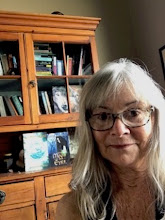When writing a trilogy how much needs to be added to explain the previous book? I've encountered lengthy prologues that I end up not reading because they seemed to have nothing to do with the book in my hand. But then again I'm one of those people who makes sure I've read Book I before I start on Book II.
When I was querying agents one of the things that often came up was the idea of the 'stand alone book'. According to them all three need to be complete in themselves. Harry Potter comes to mind. Each book was complete but each book also left the reader clamoring for the next one.The Moonstone is complete in itself but it does leave the reader with questions. Series tend to do this even when the loose ends are tied up.
In The Bridei Chronicles, by Juliet Marillier, the author goes into great depth in each succeeding book to bring the reader up to speed. For me this was overkill since I read them fairly rapidly and didn't need the update. But there were many characters and history in these books so I understand why she did it. Maybe the answer to this question lies in how complicated the plot is and how many characters are roaming through the story.
Should the summation of the first book be in a prologue? Or possibly just a paragraph or two from the first book to give a bit of extra background information? What have you encountered in your own reading that seems to work? How would you solve this problem in your writing?
if you want some more information on this topic check out: http://www.foremostpress.com/authors/articles/prologue.html

Hi Nikki,
ReplyDeleteI vote for the (at most) one paragraph "catch-up" in sequels. Author Sue Grafton is a master of doing this, inserting what you need to know in the beginning of each sequel: the protag (Kinsey) is a single, private eye, who lives in a small apartment above her octogenarian landlord. She sometimes adds that Kinsey's parents were killed in a car accident when she was only five and she was raised by her single aunt.
And that's that. Other important parts from past books get weaved in seamlessly along the way - sometimes. Each one of Grafton's 22 books can easily "stand alone."
When I started writing, I wanted to include lengthy prologues. But I don't. I think today's reader is savvy enough not to need them. So I just jump in. If the reader needs to know something "from the past," I weave it into the story.
Thanks for your post! Good food for thought!
I'm with Tracy (if she doesn't mind : ) The few follow on books I've written have been essentially standalone with elements of the previous book woven in.
ReplyDeletethanks Tracy and Mike for your comments...and I agree about weaving it into the story...
ReplyDelete